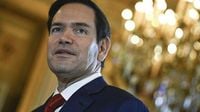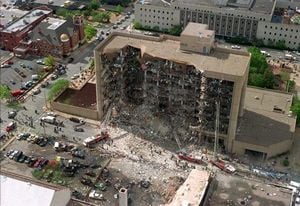As the war in Ukraine continues to unfold, the complexities surrounding peace negotiations and military engagements are becoming increasingly pronounced. On April 18, 2025, Kremlin spokesman Dmitry Peskov described talks with the United States regarding potential peace negotiations as "complicated," emphasizing that Moscow remains open to dialogue despite the challenges. Peskov stated, "The contacts are quite complicated because the subject is, of course, not simple." This statement comes at a time when both sides are grappling with the ongoing conflict that has persisted since Russia's invasion began on February 24, 2022.
In a related development, the 30-day moratorium imposed by Russian President Vladimir Putin on attacks against Ukrainian energy infrastructure expired on the same day. Peskov noted that there were "no further instructions from the Supreme Commander, President Putin," raising concerns about the potential resumption of hostilities in a sector critical to Ukraine's survival.
Meanwhile, Ukraine's President Volodymyr Zelenskyy announced an extension of martial law and general mobilization for another 90 days, effective from May 9 to August 6, 2025. This marks the 15th extension since the onset of the conflict, reflecting the ongoing urgency to prepare for sustained military engagement.
U.S. officials, who recently met in Paris with European and Ukrainian representatives, expressed optimism about reaching a complete ceasefire in Ukraine within weeks. According to reports, U.S. Secretary of State Marco Rubio indicated that the U.S. might soon halt its peace efforts if clear signs of an agreement do not materialize. "If both sides are serious about peace, then the U.S. is ready to help," Rubio stated, highlighting the precarious nature of the negotiations.
In a significant development, a raw materials agreement between Ukraine and the U.S. is set to be signed on April 26, 2025, in Washington. Ukrainian Prime Minister Denys Shmyhal is expected to travel to the U.S. for final negotiations on the contract, which aims to establish a joint investment fund for the reconstruction of Ukraine. This agreement is seen as a pivotal step in strengthening economic ties between the two nations.
On the military front, the Ukrainian Air Force successfully intercepted three Russian Iskander-K cruise missiles and 23 drones overnight, demonstrating the ongoing aerial threats posed by Russian forces. However, the situation remains dire, particularly in Kharkiv, where a recent rocket attack injured over 70 people, including five children, and resulted in at least one fatality. Local authorities reported that dozens of buildings were damaged in the assault.
Additionally, a Russian drone attack in Sumy killed a businessman who was picking up Easter cakes from a confectionery, further illustrating the indiscriminate nature of the violence affecting civilians. In the Kherson region, two road workers were also reported killed in a separate drone strike.
Reports indicate a troubling increase in the use of chemical warfare agents by Russian forces, with Ukrainian officials noting that Shahed drones have been employed to deliver concentrated irritants. The Institute for the Study of War has raised alarms about these tactics, urging civilians to stay clear of debris from the drones.
In a broader context, Russia's wealthiest individuals have seen their fortunes grow despite the ongoing war and international sanctions, with a report from Forbes revealing an increase of over eight percent in their combined wealth, totaling 551.3 billion euros. This stark contrast raises questions about the impact of the conflict on ordinary Russians compared to the elite.
Internationally, China has denied allegations from Ukrainian President Zelenskyy that it supplied weapons to Russia. Chinese Foreign Ministry spokesperson Lin Jian asserted, "China has never provided lethal weapons to any party involved in the Ukraine crisis," emphasizing Beijing's commitment to promoting peace and dialogue.
As the conflict drags on, the dynamics of international diplomacy are also shifting. U.S. President Donald Trump expressed dissatisfaction with Zelenskyy during a recent press conference, stating, "I am not satisfied with him and I am not satisfied with anyone involved in the war." This marks a notable change in tone from previous statements where Trump had placed blame on Zelenskyy for the outbreak of the war.
In a related political development, SPD leader Lars Klingbeil remarked that the future Chancellor of Germany will not make unilateral decisions regarding the potential delivery of Taurus cruise missiles to Ukraine. This reflects the ongoing debate within Germany and among its allies about the appropriate military support for Ukraine.
As the situation evolves, the complexities of the conflict and the international response remain at the forefront of global attention. The upcoming weeks will be critical in determining whether peace can be achieved or if the cycle of violence will continue unabated.
In summary, the war in Ukraine persists with no clear resolution in sight. As both sides navigate the treacherous waters of diplomacy and military engagement, the stakes remain high for the people of Ukraine and the broader international community.






